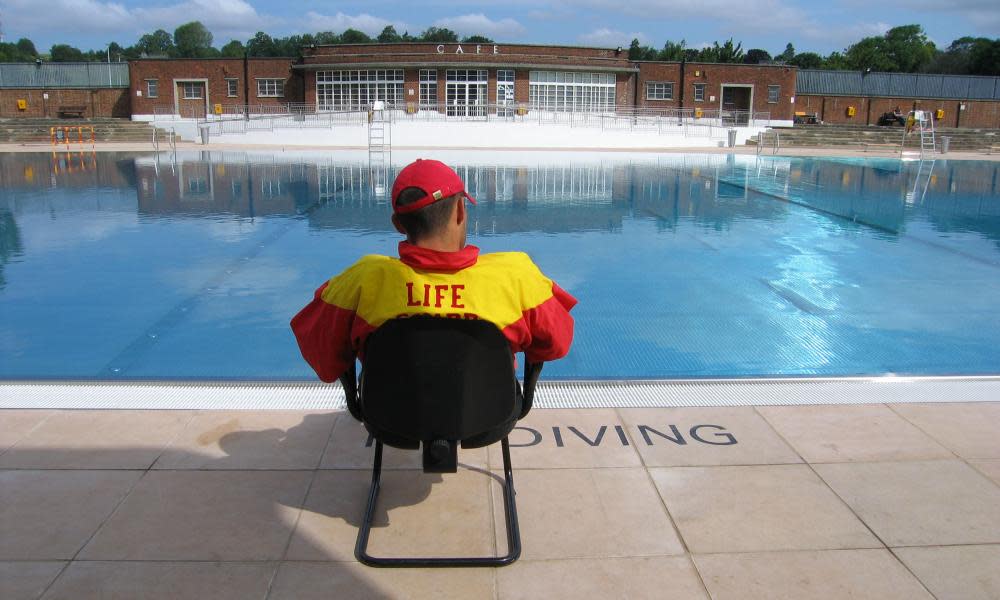Gyms, pools and nail bars: what the new rules in England allow

A range of premises in England have been allowed to resume operating this week. Here are some of the things people will and won’t be allowed to do:
Beard trims, yes – eyebrow threading, no
The government has been accused of sexism after setting rules that allow men to have their beards tidied, but prevent eyebrow and upper lip waxing or threading – services largely, but not exclusively, used by women.
Beauty parlours are allowed to open from Monday offering services that do not involve work in “the highest risk zone – directly in front of the face”. Specifically outlawed are treatments such as face waxing, eyelash treatments, makeup application and facials, which are all far more popular with women than men.
The government has said it is because there is a “much greater risk of transmission”. Yet there is no such guidance for barbers, who were allowed to open on 4 July. They were told they could “reopen for services that relate to cutting or treating hair on the head”.
According to the National Hairdressing and Beauty Federation, this prohibits shaves but allows “simple beard trims, thinning or removing bulk or length which can be done using either clippers or scissors”. This should be carried out from the side or by circling the client avoiding the face. Intricate detailing is not allowed.
Face tattoos are prohibited under the new guidelines, though you could get ink anywhere else on your body from Monday.
Swimming – the end of ‘lane rage’?
Physical distancing measures in outdoor pools will not only keep swimmers safe from Covid-19 but also eliminate “lane rage”, one lido operator has said.
Lidos can reopen on Saturday but only a few are expected to be ready in time. One is Charlton lido, which will have a limited “friends and family” reopening, with strict pre-booking.
GLL Leisure, which runs Charlton lido other and outdoor pools in London and beyond, said it would double the width of the lanes and halve the number of swimmers, making it “better than ever”.
Talking on BBC Radio 4’s Today programme, the chief executive, Mark Sesnan, said: “Swimming in the water itself is considered to be very Covid-secure because chlorine kills the virus, but obviously we’ve got to make sure that people are safe outside the water and cut interaction between people.”
Swimmers will be asked to book a time in advance and arrive “beach ready” with their costumes already on, he said. Hot showers will be allowed afterwards.
The restrictions could lead to more civilised swimming, he suggested: “We are hoping this is the end of lane rage because now there will only ever be a certain number of people in the pool, and people will be graded by their ability.”
Farewell, sweaty yoga studio
Indoor gyms, swimming pools and sports facilities can reopen from 25 July, as long as they comply with physical distancing rules. You will no longer be able to rock up whenever the urge takes you, as facilities must limit the number of users via timed booking systems.
The good news is that you will no longer end up with your head up someone else’s downward dog. This is because exercise and dance studios have been told to put temporary markings on the floor to keep people 2 metres apart.
Say goodbye, too, to sweaty yoga studios, as all premises are required to ensure adequate ventilation. Customers and staff will be encouraged to shower and change at home wherever possible, although changing rooms will be available.
Glyndebourne, yes – thrash metal, no
From Saturday, performing arts can take place outdoors with a physically distanced audience. This gives the green light to outdoor opera at Glyndebourne in Sussex and plays at Cornwall’s Minack theatre. London’s West End will also return via Six, The Musical – an all-singing account of Henry VIII and his wives – repurposed as a drive-in show.
It will remain against the law for gatherings of more than 30 people to take place in private homes (including gardens and other outdoor spaces). But arts companies are allowed to host larger groups outdoors if they follow Covid-19 secure guidelines.
When members of the public attend performances, organisers should ensure steps are taken to avoid audiences “needing to unduly raise their voices to each other”, the government said. “This includes, but is not limited to, refraining from playing music or broadcasts that may encourage shouting, including if played at a volume that makes normal conversation difficult, for example, during performance intervals.” This, it said, is “because of the potential for increased risk of transmission particularly from aerosol and droplet transmission”.
That means loud music is out, as is anything that encourages “crowding, clustering, communal dancing and physical contact, outside of household groups or support bubbles”.

 Yahoo News
Yahoo News 
